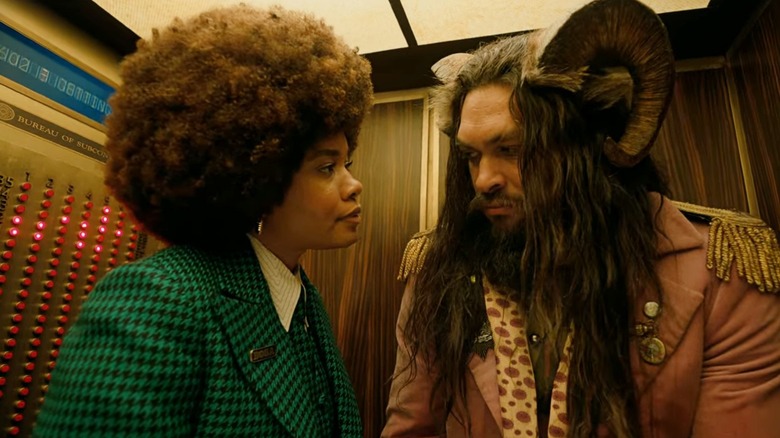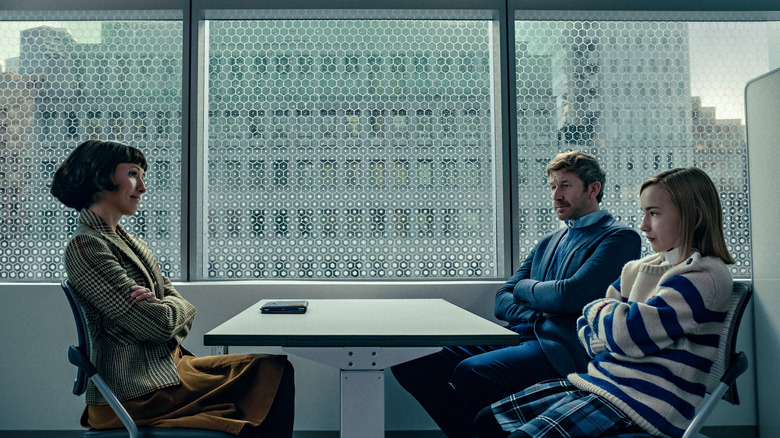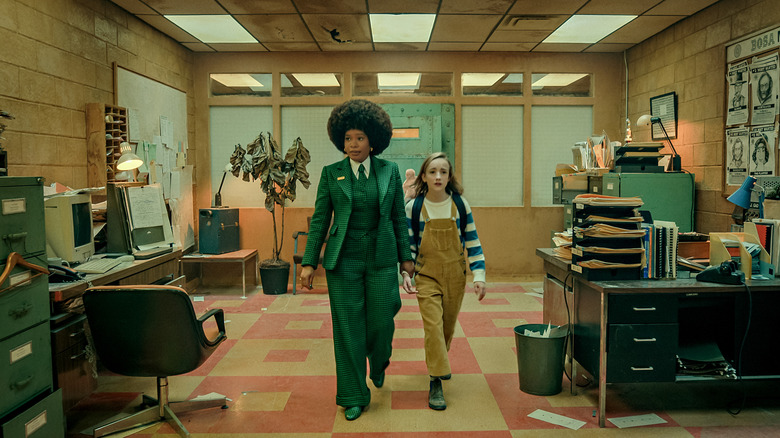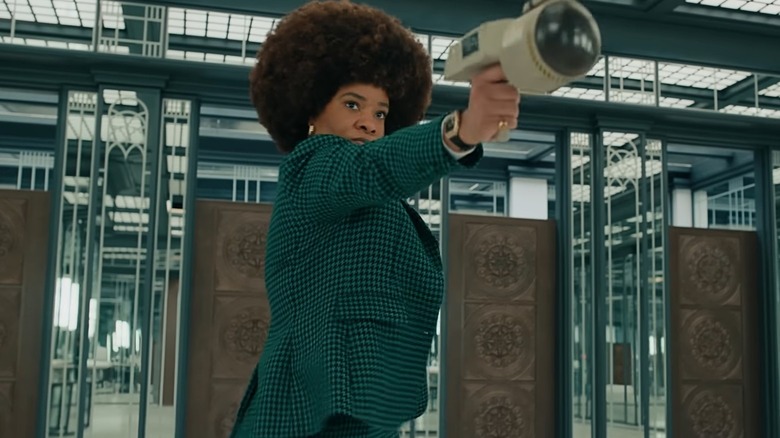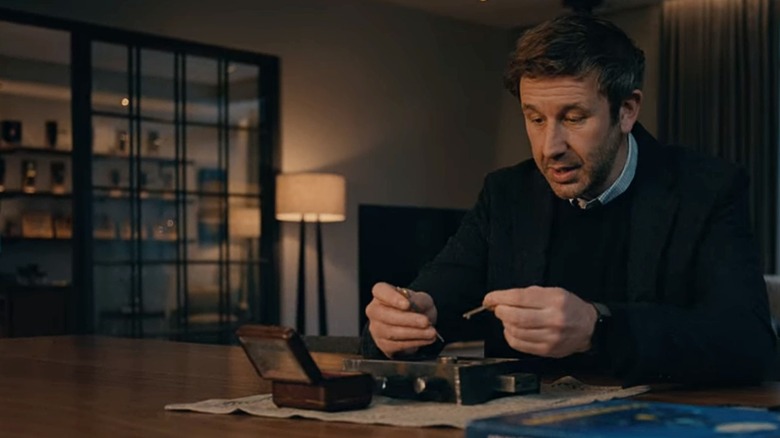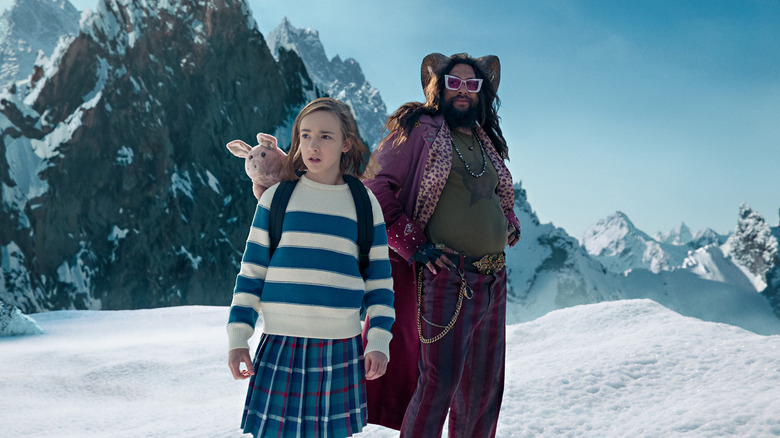Weruche Opia And Chris O'Dowd Are The Very Definition Of Cool In Slumberland [Exclusive Interview]
In Francis Lawrence's new Netflix fantasy adventure "Slumberland," young Nemo (Marlow Barkley) is enjoying a whimsical childhood as the daughter of lighthouse keeper Peter (Kyle Chandler) when circumstance forces her out of their little world and into a new life in the big city. Her new guardian is an uncle she's never met before (Chris O'Dowd) who rarely leaves his apartment building, fawns over his doorknob collection, and doesn't have the first clue how to go about raising a child.
That's just fine by Nemo, who doesn't have much interest in the waking world anyway. After she discovers her father's old outlaw partner, Flip (Jason Momoa), in one of her dreams, she learns that it's possible to navigate Slumberland and go exploring through other people's dreams. There's even a hidden treasure that will enable Nemo to wish for whatever she wants in her dreams — and Flip knows how to find it.
Blocking their path, however, is Agent Green (Weruche Opia), a zealous 160-year-old dream cop who has been hunting Flip on behalf of the Bureau of Subconscious Activity for decades. As Nemo's uncle tries (somewhat clumsily) to connect with his new ward in the waking world, a cat-and-mouse game ensues across the dreamscape as Flip and Nemo attempt to stay one step ahead of Agent Green.
With "Slumberland" now available on Netflix, /Film got the chance to chat with Chris O'Dowd and Weruche Opia about fashion, speed guns, doorknobs, and more cool stuff.
This interview has been lightly edited for clarity and brevity.
'He would have loved the pandemic'
I was just speaking with [director] Francis [Lawrence], who said the script was written before the pandemic. That kind of surprised me, because Philip has that line about how he never even has to leave his building, and he rarely does. Did the experience of living through the pandemic inform your performance at all?
O'Dowd: It certainly informed my wish to do the film, because this character is, like you say ... he would have loved the pandemic, I think, Philip. The idea that he could have been forced to remove himself from all society and civilization and obsess with his tools and his job is exactly what a character like that wants. I think he's probably got self-esteem issues and he doesn't know necessarily how to impress people, and he's estranged from his family, so he's alone. But as an actor, as me personally, I love the idea of starting that way — of that's your starting off point, and we know where he is going to go. Because it was very much my mindset at the time we were shooting in Toronto and it was very Covid-y and all of that kind of stuff. We didn't really get to meet each other very much because it was what it was, and this character gets to live again. And so that was very attractive.
Did it also inform the relationship between Nemo and Philip? There's a bit near the beginning where he goes, "Do you need a hug or anything?" They seemed to be very physically distant, as well as emotionally distant, from each other.
O'Dowd: I think that's right, and I wanted to make sure that we weren't overly comfortable with each other at the very start. Which is a tricky kind of a thing to do because you want [to be], particularly if you're a gregarious person — and I'm usually surrounded by loads of children, I have lots of nieces and nephews, so it's a lot of that, usually just people climbing all over me. But I wanted it all to be weird at the start. Or not weird, but not yet comfortable, I suppose. And not yet — just excitingly awkward, I think, is where some of the most beautiful stuff is.
'Pam Grier and a dash of Denzel Washington'
Agent Green has kind of a fun relationship as well, because she's not really a villain, she's got kind of a playful relationship with Flip and Nemo. So how do you see the Bureau of Subconscious Activity? Are they just boring buzzkills, or is there more to it than that?
Opia: I think they are boring buzzkills, but she has her own flair on how she handles stuff. I guess she's been working there for so long, she knows what goes on and she just keeps it as exciting as she can. We know that she's trying to retire, but Flip is holding her back. So we see that energy in her wanting to get him. Because she's also really good at her job. So it was just so fun to play that and explore that. The Bureau of Subconscious Activity is an incredible place. I mean, filming there and the thought of it was really fun. And being this charismatic person in that dull kind of office or job, it was really fun and it felt [like] she popped a bit. I mean the color green, as well, added the whole look of Agent Green. She had to stand out, and I guess that brought a bit of excitement to the boring Bureau of Subconscious Activity.
They're having some budget problems over there, which means that everything's from the '70s. Did you like the '70s look?
Weruche Opia: I absolutely loved it. I actually had ... that character is inspired by Pam Grier and a dash of Denzel Washington in there, but mostly Pam Grier. And so I was walking in that kind of energy, I was singing constantly. I don't know what the song's called, but [sings] "Won't you take me to Funky Town?" That was my inner song all the time.
O'Dowd: That's a good one.
Opia: And I think that just gave her a little pep in her step. And I love the fact that, even the set itself, I had discussions with the props guys and I was like, "Where did you guys find all these things?" Because it was so dated ... They'd gone and found these actual old cabinets ... So there was a lot of authenticity and it felt like I did travel into this stuck life where the Bureau was. But it was really fun and allowed my imagination to go back there — or not back there, because I've never been there — but to go there and just enjoy it all.
'That's my gun!'
I like Agent Green's gun as well. She uses it as a grappling hook, I think, to lasso Flip...
Opia: Yes. I actually did find out the other day that it's similar to a speed gun.
O'Dowd: Oh, yeah.
Opia: Because I thought it was a brand new thing that someone had imagined, this magic gun, this magic freeze thing. And then I was watching a film and someone [used a speed gun] ... I was like, "Oh my gosh, that's my ... That's the gun. That's the..."
O'Dowd: They nicked it!
It's a lot cooler though because it does stuff other than just tell you how fast cars are going. It also freezes people.
Opia: I mean, I'll take it. I'll take it.
O'Dowd: Hey. Speed guns are pretty cool, too, you know. Had a lot of success stories in the past, on screen.
Opia: Have you?
O'Dowd: Yes.
Does it have any functions that we didn't see, that didn't make it into the final cut of the movie?
Opia: No, I think [freezing is] the only function it has. And I think that's a powerful function to have. So that was fun. That was fun to do that.
It would be good if real speed guns could do that, because you could freeze a car that was going too fast.
Opia: See, now that would be smart and would prevent a lot of accidents.
'Fiddle it, put it in, hope it works, and then head off'
I think Philip's pretty cool. He has a cool hobby, which is doorknobs. I liked the scene where Nemo throws the doorknob book across the room because it's too interesting.
O'Dowd: "Cool" is a word that has gone beyond definition if we think Philip is cool. But he certainly is specific in his loves, and I think that a lot of us are a bit like that. I love how nerdy he is. I love that he has thrown himself into something so wholeheartedly. But I fear it's probably because he can't deal with the real world.
Did you learn any interesting doorknob facts?
O'Dowd: Oh, I don't know if I learned a lot of facts, but we did learn how to pick locks. They had a guy come in. I mean our job, most of the time, is so great because we get to learn –
Opia: Have you used that in real life?
O'Dowd: Oh yeah. I've nicked a lot of stuff ... He collects antique [locks], so they're all very old. I don't know if what I learned would be of use to me now. Unless I was in ... The one that we had was from Alcatraz, which is pretty cool. So you pull out the locks with these things ... It's very much what you would imagine. It's kind of — fiddle it, put it in, hope it works, and then head off. Which ... speaks to a lot of things.
I'm going to say that doorknobs are a cool hobby, officially. I think Philip's cool.
O'Dowd: I can tell you and I are the coolest ones here.
Opia: Oh my goodness.
Warning: Major spoilers for "Slumberland" ahead!
'The four-pronged attack of acting'
How did you go about merging Flip into Philip? Because they're very, very different people in terms of their behavior.
O'Dowd: I mean, you have to think about the long game really with it ... But like you say, he does end up in the course of our story — and our story isn't necessarily over yet — being somewhat the same person but only through the prism of her imagination. So I don't have to think about it too literal a way. I have to think about it in a way where it's like, what elements of the reality have been borne out in not only her retelling of this character, but also in the father's retelling, of Kyle Chandler's retelling of Flip ... So it's like, "Well what does he think about what I am? And what does he think about how the other guy is?" So it's tall, glint in the eye, beard, and occasional cursing, and I think that's basically the four-pronged attack of acting.
And great fashion sense.
"Slumberland" is available now on Netflix.
